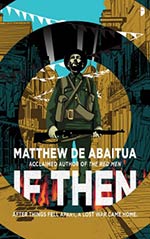
![]() pizzakarin
pizzakarin
8/25/2015
![]()
I received an advanced copy of If Then from the publisher in exchange for honest feedback.
--------------
"'Can I stop this?' he whispered.
'Your decisions are made six seconds before you are aware of them. What you think of as free will is post-rationalization. You live in the past, James.'
'No second thoughts?'
'Your decision has already been made. Don't waste my time with excuses." -Location 1696
I loved the characters of James and Ruth. They used to be average people, they had white collar jobs, got married, wanted to start a family, and felt helpless when their security disappeared. When a possible solution appeared they did what they thought was necessary to survive. They put themselves in the hands of The Process trusting that it would look after them. Their sense of betrayal when The Process started behaving incomprehensibly is an amplification of the kind of betrayal we all feel when our governments and politicians let us down.
I found myself fascinated by how the author used tense shifts to signal who is in control and to keep me off-balance. When the characters are in control of themselves narration is in past tense, when The Process is in control narration is in present tense, which makes sense because The Process is in an eternal "now", constantly manipulating the eponymous "then". If A happened, B is what The Process is doing. Over and over, blindingly fast, astronomical numbers of Ifs and even more Thens, until even the story must bend into the present tense to follow James under The Process's control.
The tense also keeps the book feeling surreal. The past tense is used when describing the characters' "present", which is also a regressive future to the reader. The present tense is used when describing the present-as-controlled-by-The-Process, which is a mimicry of events in our past.
"Since the procedure, his forgeries have taken a new quality. He forged an eggshell that when cracked releases albumen and yolk which react to hot oil to form a perfect round fried egg. It is only when you eat the egg that you realize it is made of paint." -location 2177
Besides a surreal atmosphere, there is some perfectly executed and beautifully described weirdness in If Then. Every once in a while, just when things are starting to feel, if not normal, consistent, De Abaitua drops in reminders that the people of Lewes live in a manufactured reality, carefully controlled by something that can quantify, but not understand, humanity. I was drawn into James' perceptions over and over just for us to be reminded that people and their actions were not genuine.
I can't recommend this book more highly. It's slipstream fiction for polymaths. If Then flips off expectations of genre and leaves me feeling like I'm riding its shockwave into the future of literature.
http://boldlyread.blogspot.com/2015/08/review-if-then-by-matthew-de-abaitua.html